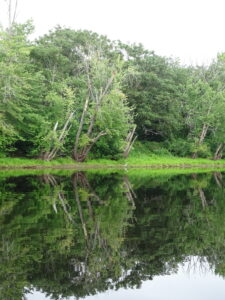New Climate Plan Includes Action For Nature
The Government of New Brunswick released their new Climate Change Action Plan yesterday, “Our Pathway Towards Decarbonization and Climate Resilience”, describing the actions they will take to help the province address the challenges posed by climate change. This is a 5-year plan with actions that will take us to 2027, building on the previous plan from 2016.
The Exciting Good News – CPAWS NB is excited that government recognizes the role nature will play in our response to climate change. The government will take these actions to ensure nature is protected and can continue to support habitats for people and wildlife:
- Set a new target for protected areas by 2024, which will take New Brunswick beyond protecting 10% of the province’s land and freshwater
- Establish a working group with Indigenous communities and organizations by 2024 to identify climate change priority areas and facilitate information sharing
- Bring climate change concerns into the way they plan and manage provincial parks
- Identify climate-vulnerable wildlife, habitats, and landscapes that will need extra conservation attention and connect habitats to allow for wildlife migration
 WHAT NEEDS TO HAPPEN NOW
WHAT NEEDS TO HAPPEN NOW
Climate change impacts all New Brunswickers. The province is experiencing more extreme weather events such as flooding or droughts, increased temperatures and sea-level rise. This affects the safety and well-being of individuals and communities, businesses and industries.
- Government needs to move swiftly to protect more nature, given the urgency of the climate and nature crises. New Brunswick needs to set a target and take action to help achieve the nation-wide target of protecting 30% of Canada by 2030.
- The conversation and working groups with Indigenous peoples cannot wait until 2024 and needs to start immediately.
- Government needs to speed up the engagement with community groups, NGOs, and municipalities to build common awareness and the will in society to work on these actions together.
THE IMPORTANCE OF NATURE
Nature offers some of the best solutions for New Brunswick’s response to climate change. Intact natural areas are more resilient to a changing climate and are better able to support a variety of wildlife and habitats. Forests and wetlands capture and store carbon, helping to reduce greenhouse gas emissions. Nature-based solutions, like natural shorelines and salt marshes, can help protect communities from the effects of flooding, erosion and sea-level rise.
Other notable actions the government plans to take for climate and nature:
- Assess the carbon stored in wetlands to help identify the most climate-significant wetlands by 2026, with a full report to be released by 2030
- Invest in Climate Change Initiatives through the New Brunswick Environmental Trust Fund to support NGOs and local communities
- Publish a report on the carbon stored in New Brunswick’s forests by 2025 and regularly track and report on the forest’s ability to store and absorb carbon
- Recognize and promote the importance of nature and natural infrastructure to buffer us from climate change impacts
- Support nature-based solutions by training and building partnerships among communities and organizations
- Develop a renewed Biodiversity Strategy by 2025 that recognizes the sensitivity of biodiversity to climate change, the need to adapt the way New Brunswick manages and uses the natural environment, and the role that nature can play in climate solutions
- Implement a Living Shorelines program by 2026 that promotes natural adaptation approaches and nature-based solutions through training, science-based tools, and best practices made available to New Brunswick property owners
